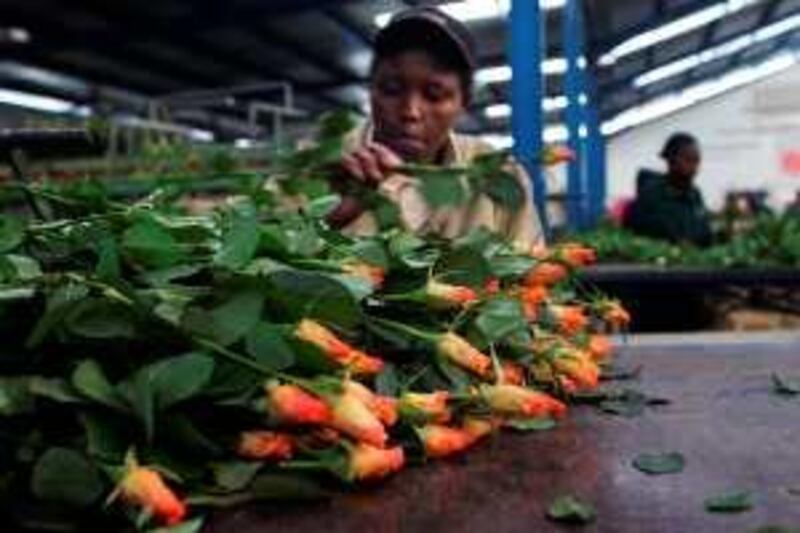NAIROBI // Business is good at Panda Flowers. The Kenyan flower company ships 200,000 red, yellow, orange and pink long-stem roses per day, mostly to florists in Europe and Asia. But the company is missing out on the sweetest market of all: the United States. The high cost of shipping from Kenya to the US makes it impossible to compete with South American flower growers. Despite a raft of trade incentives the American government has in place with African countries, the company still cannot work out a way to do business with the US, said Richard Hechle, the general manager.
"The favourable trade status does not give us an advantage at all," Mr Hechle said. "We still struggle to compete in the US market." This is just the type of problem high-ranking American officials, including Hillary Clinton, the secretary of state, hope to address this week during the African trade and economic co-operation forum in Nairobi. The African Growth and Opportunity Act (AGOA), passed in 2000, allows some African countries to export goods to the US without tariffs, giving them a competitive advantage over goods from other countries. The goal was to stimulate local industries and "agribusinesses", helping Africa develop sustainably and weaning the continent away from foreign aid.
In a speech in Ghana last month, Barack Obama, the US president, said he wanted to make trade a key part of his Africa policy. "I have no doubt that Africa holds the promise of a broader base of prosperity," Mr Obama said. "America can also do more to promote trade and investment. Wealthy nations must open our doors to goods and services from Africa in a meaningful way. That will be a commitment of my administration."
In the last nine years, AGOA has had mixed results. Some of the 39 African countries trading under the act have seen an increase in exports to the US, the world's biggest market. In 2008, US AGOA-eligible imports from Africa rose by 30 per cent over the previous year to US$66 billion (Dh242.4bn), according to the US department of commerce. However, petroleum products from such countries as Nigeria and Angola accounted for 92 per cent of this trade. Products from Kenya's fledgling textile industry have slowly found their way to the US market, but the industry is still burdened by prohibitive shipping costs.
"Getting our products to the US is a problem because of freight charges," said Pauline Ngoru, general manager of Tarpo, a Kenyan tent manufacturer. "It's a real handicap." Kenya's AGOA exports, valued at $250 million last year, may be inflated by transhipping. Some manufacturers in China and India send their products to Kenya, slap a "Made in Kenya" label on them and ship them on to the US duty-free under AGOA. While this practice is illegal, corruption and loose regulations in Kenya have allowed it to continue.
"Somewhere along the way, our textile industry was hijacked," said Paul Gamba, an economist at Egerton University in Nakuru, Kenya. "When you look at the volumes, you know it didn't all come from Kenya." The agricultural sector, which is Kenya's top foreign exchange earner, has fared little better in getting products to American consumers. "You have the government talking about AGOA, but the opportunity has not trickled down to the farmers," said Kanywithia Mutunga, the head of the Kenyan national federation of agricultural producers.
"We need to organise farmers to align themselves so that they can benefit." "The private sector is going to take advantage of AGOA to expand trade and investment," said Joseph Wairiuko, the head of advocacy at the Kenyan association of manufacturers. "We have to exploit this opportunity." The legislation is set to expire in 2015 and American officials hope that, by then, African industry will be developed enough to compete on an equal footing with the rest of the world.
"For African economies to compete with advanced economies, they need a boost to get to that level," Mr Gamba, the economist, said. "Handouts are not good. You need something that is sustainable, which is why I think the intention of this is good." mbrown@thenational.ae





